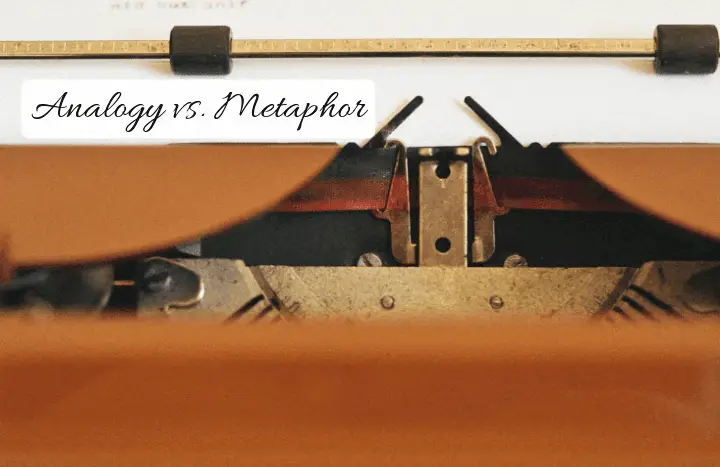
If you want to become a skilled copywriter and storyteller, you need to learn the difference between an analogy and a metaphor.
The main difference is that an analogy is a comparison between things, and a metaphor is a figure of speech where you use one word or a phrase to refer to something else.
To clarify the difference between the two, let’s look at examples:
- Analogy – “Life is like a box of chocolates – you never know what you’re gonna get!”. As you can see, it’s a clear comparison between the two things used to make a point.
- Metaphor – “I’m drowning in a sea of grief.” Here, things are different. You’re using drowning in a sea (one thing) to communicate your emotional state (another thing).
Analogy vs. Metaphor: Formal Definitions and Examples Showing the Difference
An analogy is a comparison between two situations, processes, historical events, etc. to show that they are similar. You can draw an analogy to explain things more easily (especially when talking about a sensitive topic). Example: “Just as a sword is the weapon of a warrior, a pen is the weapon of a writer”. A metaphor is a word or phrase that means one thing and is used to refer to another thing to emphasize their similar qualities. Example: “His words cut deeper than a knife.” Important note: make sure not to confuse an analogy with a simile. A simile is a figure of speech where you directly compare two things using the words “as” or “like”. Example – “her dress is as colorful as a peacock’s tail”.
Related content: Truly Vs. Truly (or Truly!?) – Which One Is Correct?
Using an Analogy Correctly
An analogy is the language of an argument. You can often hear intellectuals saying that in a particular case, “the analogy holds water”, meaning, the comparison remains logical throughout the whole argument. But sometimes, an analogy can be great to convey meaning in a simplified way but at some point, it “breaks down” or “doesn’t hold water”. It means that the comparison isn’t completely accurate (but it can still be helpful). For example, let’s look at the “bathtub analogy”. You could say that the rising of the sea levels happens evenly and predictably, just like when you’re pouring water into a bathtub. But ironically, this analogy doesn’t hold water because the sea levels rise unevenly and unpredictably. The analogy is too simple for a complicated process like changes in the climate. Great writers and speakers constantly work on improving their analogies so they’re clearer and more effective. One of my favorite analogies comes from Bruce Lee where he compares an effective fighting style to the formlessness of water: “You must be shapeless, formless, like water. When you pour water into a cup, it becomes the cup. When you pour water into a bottle, it becomes the bottle. When you pour water into a teapot, it becomes a teapot. Now water can flow or it can crash. Be water, my friend.”
Using a Metaphor Correctly
A metaphor is the language of poetry and literary novels. It’s used to create a lasting impression and make your words more memorable. “He reeks of infidelity” sounds much different from “he cheated on her”. It’s a different emotional punch. In Sin City, one of the characters says: “The fire, baby. It’ll burn us both. There’s no place in this world for our kind of fire. My warrior woman. My Valkyrie. You’ll always be mine. Always. and never.” Now, do you see the power a metaphor can yield? He could have said, “Our love is too strong and we’ll get in trouble because of it”. But this would sound empty and downright ridiculous. Metaphors are used to say things well and are a powerful weapon in the writer’s arsenal. By the way, the metaphor from the previous sentence is a “dead metaphor” that lost its punch through overuse. There are at least five other types of metaphors, but that’s another story. I hope that by reading this explanation and notable examples, you’ll now understand the main differences between an analogy and a metaphor. Next up, you may want to explore a list of the most beautiful words in the world.
Get your free PDF report: Download your guide to 80+ AI marketing tools and learn how to thrive as a marketer in the digital era.
Hey there, welcome to my blog! I'm a full-time entrepreneur building two companies, a digital marketer, and a content creator with 10+ years of experience. I started RafalReyzer.com to provide you with great tools and strategies you can use to become a proficient digital marketer and achieve freedom through online creativity. My site is a one-stop shop for digital marketers, and content enthusiasts who want to be independent, earn more money, and create beautiful things. Explore my journey here, and don't miss out on my AI Marketing Mastery online course.


